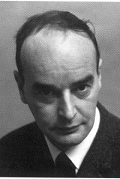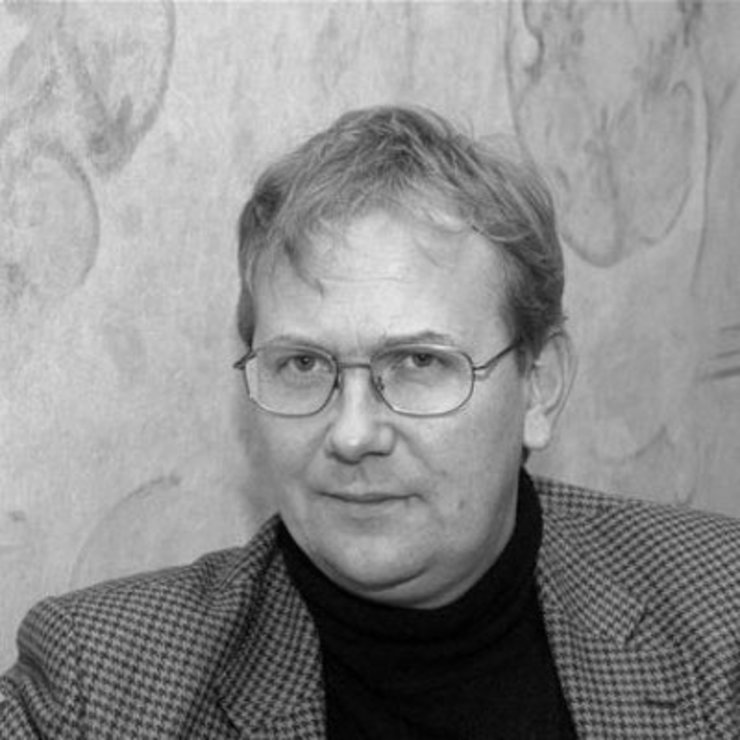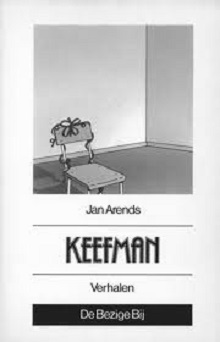In the spotlight: Keefman

Courtesy of Philip Mechanicus
Keefman is a collection of short stories by Jan Arends. Little biographical information is known about Jan Arends. He was born on February 13, 1925 in The Hague as an illegitimate child of Gerardina Arends. His mother suffered from rheumatism at an early age, so he was soon sent to a strict Catholic boarding school and trained as a cobbler. Arends wandered through Europe and practiced all kinds of professions, but the most striking ones are the domestic servant and copywriter. He gave a controversial interview to Dick van de Pol in the magazine Vrij Nederland in 1972 about his crazy life and experiences as a servant (Aarts and Wierema 1979: 91-102). His oeuvre consists mainly of prose in short stories and poetry.
A special issue of the journal De Engelbewaarder (1979) collected contributions from literati who all kept memories of Jan Arends and this issue also contextualizes Arends' life course and to a lesser extent his work. In the contribution application, Rudi Kousbroek has gone furthest in his praise for Arends and feels that his work is worthy of a Nobel Prize, especially the story Vrijgezel op Kamers (Bachelor in a room) He compares his work with the Grand Master of the short story in the Netherlands, J.M.A. Biesheuvel, but besides the thematic analogy in the stories that take place in the background of the asylum (the psychiatric institution) he finds no common ground. At the same time he makes the comparison with a French or Russian major author. He concludes that Arends' work is truly original in the sense that it is universal and his literature does not depict the inevitable, the fateful, in a language that is without frills. Joop Waasdorp, according to his appearance, calls him an eccentric figure, someone who could have run away from a story by the Russian writer Gogoľ (Aarts and Wierema 1979: 112-113, 129).
Arends was a phenomenon in Dutch literature because he wrote during his various stays in psychiatric institutions. He died in 1974 when he jumped out of a window and committed suicide. In addition to prose and the copywriting he did professionally, Arends also wrote poetry. A collection of collected works was published by the Bezige Bij publishing house in 1994. He also lives on in the popular culture of the Low Countries, the popular singer Frank Boeijen wrote a song about him, de Prijs (van Jan Arends) and the Flemish singer-songwriter Kris de Bruyne composed his poem Lieve Jacoba (Dear Jacoba) on music.
Keefman contextualised by Adam Bžoch

Adam Bžoch, in his afterword to Keefman's translation (2020: 116-117), highlights the theme of antipsychiatry, in which Arends' short stories drew attention to the problems of the mentally ill. People had become skeptical of heavy medication for patients and of confinement in institutions, and had started to pay more attention to the creative sides of their imaginary worlds. Although his short stories are nevertheless primarily associated with his own world and experiences as if they were ego-documents, there are, for example, similarities with other literary works. We have in this case the Russian authors already mentioned: indeed, the character of the lower, troubled Russian official from the Jacket (or. Russian Šineľ) or the character meeting his own nose taking a carriage ride in the Nose (or. Russian: Nos) from Nikolai Gogoľ's Peterburg Tales is a motif that is very similar. Bžoch also mentions the similarity to the narrative style in Franz Kafka's short stories, with Arends parodying the themes of Die Verwandlung (The Metamorphosis), Vor dem Gesetz (Before the Law) and Ein Bericht für eine Akademie (A report to an academy) mainly in the short stories Vrijgezel op Kamers (Bachelor in the Room), De Weldoener (The Benefactor) and Het ontbijt (The Breakfast), managing to copy both their mythological and religious pathos.
Keefman: Contents
Keefman contains 11 other short stories in addition to the title story. All provide an inside look at characters struggling with a mental health problem in different contexts. In the title story Keefman, a patient writes an angry letter to a doctor who has interned him. He addresses the doctor as Friend. In the story Vrijgezel op kamers we find parallels with the life of Arends who himself moved frequently and had to stay in rooms. The main character, Mr. van Dongen, is assigned a room in a boarding house where a grumpy lady lives. The room is very dark and as the story progresses, the main character stays in his bed, does not go to work to the office anymore and gradually gets sick. The other stories are shorter. In each case we are faced with characters who, like Arends, the author himself, feel like an outsider in society.

Keefman transnational
So far in translation with the help of the DBLT and the database of the Literary Fund five languages were found in which the work of Arends was translated: English, Arabic, Bulgarian, Slovak and Swedish. We find the short stories collection Keefman in Swedish in 2019 and in Slovak in 2020, the rest are poems that can be found in anthologies and literary magazines. Remarkable is the Bulgarian translation already from 1981, whereas the other translations are quite recent (published after 2010).
Translations of Jan Arends:
Arends, Jan. [Covek"t, kojto jadese vestinci] Bulgaars / vert. uit het Nederlands door Antoaneta Primatarova-Milceva. s.l.: n.n., 1981. In Narodna Kultura: organ na komiteta za kultura, jrg.25 (1981) nr.34, p.8. Poëzie, Vert. van Een keuze uit het werk. s.l.: n.n., Aanwezig in bibliotheek Nederlands Letterenfonds.
auteurs, div.. [(Bloemlezing Nederlandse poëzie)] Arabic / transl. from Dutch by Salah Hassan. Beirut: Dar-Alfarabi, 2011. Poetry, paperback. Original title: Bloemlezing. s.l.: n.n., Bevat: Hendrik Marsman, Martinus Nijhoff, M. Vasalis, Remco Campert, J.C. van Schagen, Simon Vinkenoog, Rutger Kopland, Hans Lodeizen, Neeltje Maria Min, Arjen Duinker, Toon Tellegen, Annie M.G. Schmidt, Judith Herzberg, Willem Wilmink, Jean Pierre Rawie, Alfred Schaffer, Anne van Amstel, JAN ARENDS, Frank Starik, Mark Boog, Esther Jansma, Sylvia Hubers, Harry Zevenbergen, Anneke Claus, Henriette Faas, Tsead Bruinja, Thomas Möhlmann, Gerrit Achterberg, Anna Enquist, Hester Knibbe, Gerrit Komrij, Gerrit Kouwenaar, Ed Leeflang, Ilja Leonard Pfeijffer, Elly de Waard, Chr. J. van Geel, K. Schippers, Ellen Warmond, Kreek Daey Ouwens. Published with support from the Nederlands Letterenfonds. Present at the library of the Nederlands Letterenfonds.
Arends, Jan. Keefman. Slowaaks / vert. uit het Nederlands door Adam Bžoch. Bratislava: Európa, 2020 (Edícia Tulipán; 18). Fictie, gebonden. Vert. van Keefman. Amsterdam: De Bezige Bij, 1972. Uitgegeven met subsidie van Nederlands Letterenfonds. Aanwezig in bibliotheek Nederlands Letterenfonds.
Arends, Jan. Keefman. Berättelser Zweeds / vert. uit het Nederlands door Joakim Sundström. Stockholm: Flo förlag, 2019. Fictie, paperback. Vert. van Keefman. Amsterdam: De Bezige Bij, 1972. Uitgegeven met subsidie van Nederlands Letterenfonds. Aanwezig in bibliotheek Nederlands Letterenfonds.
auteurs, div.. Poetry from the Netherlands. English / transl. from Dutch by David Colmer, James Brockway, Donald Gardner, Francis R. Jones, Michele Hutchison, David McKay, Judith Wilkinson, Scott Rollins, Vivien D. Glass. Kolkata: The Enchanting Verses Literary Review, 2017. In The Enchanting Verses Literary Review, nr. 26 (december 2017), Poetry; Anthology, paperback. Original title: Bloemlezing. s.l.: n.n., Bevat: Martinus Nijhoff, Gerrit Achterberg, M. Vasalis, Hanny Michaelis, Gerrit Kouwenaar, Hans Lodeizen, Lucebert, JAN ARENDS, Remco Campert, Hans Faverey, Cees Nooteboom, Bernlef, Toon Tellegen, Neeltje Maria Min, Anna Enquist, Frank Koenegracht, Hester Knibbe, Joke van Leeuwen, Elma van Haren, Benno Barnard, Esther Jansma, Nachoem M. Wijnberg, Menno Wigman, Erik Lindner, Mark Boog, Hagar Peeters, Maria Barnas, Alfred Schaffer, Ramsey Nasr, Mustafa Stitou, Kira Wuck en Ester Naomi Perguin. Published with support from the Nederlands Letterenfonds. Present at the library of the Nederlands Letterenfonds.
(Benjamin Bossaert)
References
Aarts, C.J. en Wierema, Thijs (eds.) Jan Arends In: De Engelbewaarder, jg. 4, april, 1979.
Arends, Jan (1994). Verzameld werk. Bezorgd door Thijs Wierema. Amsterdam: De Bezige Bij.
Arends, Jan (2020). Keefman. Preložil Adam Bžoch. Bratislava: Európa.
